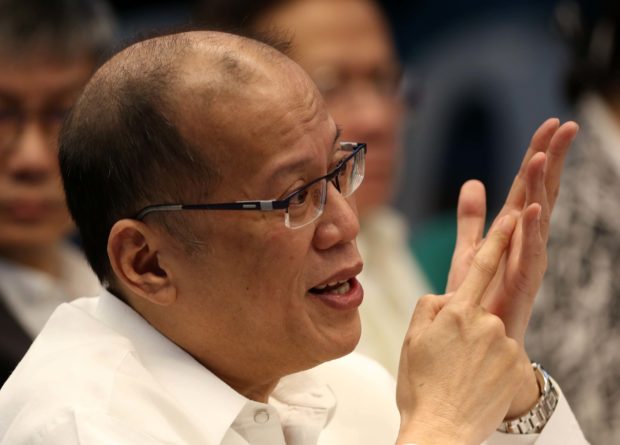Aquino: It’s my duty to explain

Former President Benigno Aquino III at the Senate probe into Dengvaxia, the dengue vaccine procured and used for an immunization program during his administration.
INQUIRER PHOTO/LYN RILLON
President Benigno Aquino III believed it was his duty, even as a private citizen, to “allay certain fears” due to a decision he had made when he was the nation’s leader.
This was the reason he accepted the invitation to Thursday’s Senate hearing on the P3.5-billion antidengue immunization program.
The controversy over the Dengvaxia vaccine erupted after its manufacturer, the French pharmaceutical giant Sanofi Pasteur, disclosed two weeks earlier that it could cause severe symptoms in people not previously exposed to the mosquito-borne dengue virus.
“With the announcement of Sanofi and the reactions to it, there has been a lot of tension building up and I think it is incumbent upon me even as a citizen to try and allay certain fears, to put it in the proper perspective, to put it on the proper level,” Aquino told reporters when asked if appearing at the inquiry was demeaning to a former President.
Aquino, who stepped down on June 30 last year, was the second former President who had attended a congressional hearing on an administration flagship program.
Article continues after this advertisementFormer President Fidel Ramos appeared at the investigation of the multibillion-peso Centennial Expo project in Pampanga.
Article continues after this advertisementThe immunization program was important for the Aquino administration as dengue infection and deaths rose nationwide.
Opportunity
Aquino also said attending the hearing was “an opportunity to answer innuendos.”
At the hearing, Ferdinand Topacio, a lawyer for the Volunteers Against Crime and Corruption, accused Aquino and former Health Secretary Janette Garin of plunder and urged senators to look for the evidence to back his charges.
At a press conference after the hearing, Aquino said he had wanted to tell Topacio he was “destroying our reputation.”
“We can sue you for slander because of the accusations you’ve made,” Aquino said.
He said that instead of asking senators to do the work of backing an allegation “it is the duty of the accuser to find the evidence.”
The government purchased the antidengue vaccine at the tail end of the Aquino administration. However, as early as two months after he took office in 2010 Aquino said then Health Secretary Enrique Ona told him three regions reported dengue cases had increased by more than 100 percent.
In one of the worst case scenarios painted for him, an estimated 2.8 million Filipinos would be infected and the cost of medication and hospitalization would be about P58.2 billion, Aquino said.
He said it was the government’s obligation to calm the public’s anxiety by providing information about Dengvaxia and giving advice on what to do.
He stood by his administration’s decision to use the vaccine, especially for schoolchildren who were the most vulnerable. There was no “evil intent” in the decision to approve the vaccine, he added.
Asked if he thought Sanofi should be held accountable, he said: “If it can be proven that they withheld information or pertinent information, yes.”